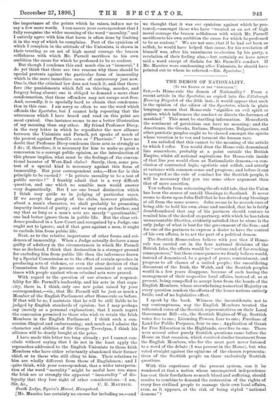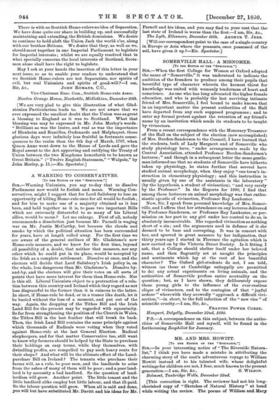THE DEMON OF NATIONALITY.
[TO THE EDITOR OF THE "SPECTATOR."] SIE,—Is Home-rule the demon of Nationality ? From a recent article in the Spectator, as copied into the Edinburgh Evening Dispatch of the 20th inst., it would appear that such is the opinion of the editor of the Spectator, which in plain language means that Home-rule " signifies an evil spirit or genius, which influences the conduct or directs the fortunes of mankind." This must be startling information. Henceforth the sentiment of patriotism can have no meaning; and the Americans, the Greeks, Italians, Hungarians, Bulgarians, and other patriotic peoples ought to be classed amongst the spirits whose vocation is to vex and torment the human race.
I am satisfied that this cannot be the meaning of the article to which I refer. You would draw the Home-rule demoniacal line somewhere, probably at a point outside the British Empire, whilst all national aspirations for Home-rule inside of that line you would class as Nationalistic demons,—a con. elusion of contracted logic, egotistic and selfish, and utterly at variance with common-sense and progress ; and before it can be accepted as the rule of conduct for the Scottish people, it will be necessary that you use some other argument than that of mere assertion.
You refrain from reiterating the oft-told tale, that the Union has been the source of untold blessings to Scotland. It never seems to dawn upon John Bull that he has derived any blessings at all from the same source. John seems to be so cock-sure of being able to hold his own, alone and unaided, that he is fairly dumbfoundered that any of his partners should venture to remind him of the deed of co-partnery, with which he has taken unwarrantable liberties, evidently satisfied that he alone is the only judge of what is best for the government of the firm ; and for one of the partners to express a desire to have the control of his own affairs, is to act the part of a political demon.
The Scottish Home-rulers believe with you that if Home.
rule was carried out in the four national divisions of the British Isles, the effects would be "serious and of far-reaching consequences;" but these consequences we firmly believe would, instead of demoniacal, be a gospel of peace, contentment, and progress to all classes of a united people ; the smouldering discontent of the Irish, the Welsh, and the Scottish peoples would in a few years disappear, because of each having the management of their respective local affairs, instead of, as at present, being compelled to accept laws from the hands of the English Members, whose overwhelming numerical Majority on every question renders the efforts of the lesser nations entirely futile, and of no legislative effect.
I speak by the book. Witness the inconsiderate, not to say contemptuous, way the English Members treated the reiterated votes of the Scottish representatives on their Local Government Bill—viz., the Scottish Rights-of-Way, Scottish votes five to one ; Licensing Powers, four to one ; Purchase of Land for Public Purposes, four to one ; Application of Grant for Free Education in the Highlands, over five to one. There were several other purely Scottish questions came before the House on that occasion, which received similar treatment from the English Members, who for the most part never listened to a word of the debate (I was present in the House), but who voted straight against the opinions of the chosen representa- tives of the Scottish people on those exclusively Scottish questions.
With this experience of the present system, can it be
wondered at that a nation whose unconquered independence has cost their forefathers so much blood and suffering, should resolve to combine to demand the restoration of the rights of every free civilised people to manage their own local affairs, even, as it. appears, at the risk of being styled " national demons " ?
There is with us Scottish Home-rulers no idea of Separation. We have done quite our share in building up, and successfully maintaining and extending, the British dominions. We desire to continue to hold aloft the Union Jack the world o'er, along with our brother-Britons. We desire that they, as well as we, should meet together in one Imperial Parliament to legislate for Imperial interests; whilst we are equally resolved that in what specially concerns the local interests of Scotland, Scots- men alone shall have the right to legislate.
May I ask at your hands the insertion of this letter in your next issue, so as to enable your readers to understand that we Scottish Home-rulers are not Separatists, nor spirits of evil, but real Unionists and spirits of good-will P—I am, Vice-Chairman Exec. Com., Scottish Home-rule Assoc.
Newton Grange House, Newbattle, Midlothian, December 20th.
[We are very glad to give this illustration of what Glad- stonian Particularism leads to. We are not aware that we ever expressed the smallest doubt that the Union was as great a blessing to England as it was to Scotland. What that blessing was may be expressed in Mr. John Morley's words : " Brilliant as was the lustre, and real as was the importance of Blenheim and Ramilles, Oadenarde and Malplaquet, those glorious days were infinitely less fruitful in fortunate conse- quences to the realm than the 6th day of March, 1707, when Queen Anne went down to the House of Lords and gave the Royal assent to the Act approving and ratifying the Treaty of Union between the two Kingdoms henceforth to be known as Great Britain." (" Twelve English Statesmen," " Walpole," by John Morley, p. 11.)—En. Spectator.]



































 Previous page
Previous page